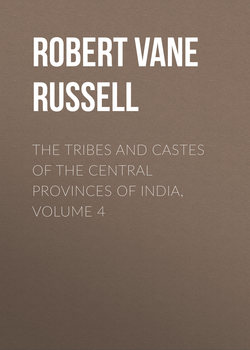Читать книгу The Tribes and Castes of the Central Provinces of India, Volume 4 - Robert Vane Russell - Страница 37
Part II
Articles on Castes and Tribes
Kumhār—Yemkala
Vol. IV
Kunbi
24. Social and moral characteristics
ОглавлениеSome characteristics of the Marātha people are noticed by Sir R. Jenkins as follows41: “The most remarkable feature perhaps in the character of the Marāthas of all descriptions is the little regard they pay to show or ceremony in the common intercourse of life. A peasant or mechanic of the lowest order, appearing before his superiors, will sit down of his own accord, tell his story without ceremony, and converse more like an equal than an inferior; and if he has a petition he talks in a loud and boisterous tone and fearlessly sets forth his claims. Both the peasantry and the better classes are often coarse and indelicate in their language, and many of the proverbs, which they are fond of introducing into conversation, are extremely gross. In general the Marāthas, and particularly the cultivators, are not possessed of much activity or energy of character, but they have quick perception of their own interest, though their ignorance of writing and accounts often renders them the dupes of the artful Brāhmans.” “The Kunbi,” Mr. Forbes remarks,42 “though frequently all submission and prostration when he makes his appearance in a revenue office, is sturdy and bold enough among his own people. He is fond of asserting his independence and the helplessness of others without his aid, on which subject he has several proverbs, as: ‘Wherever it thunders there the Kunbi is a landholder,’ and ‘Tens of millions are dependent on the Kunbi, but the Kunbi depends on no man.’” This sense of his own importance, which has also been noticed among the Jāts, may perhaps be ascribed to the Kunbi’s ancient status as a free and full member of the village community. “The Kunbi and his bullocks are inseparable, and in speaking of the one it is difficult to dissociate the other. His pride in these animals is excusable, for they are most admirably suited to the circumstances in which nature has placed them, and possess a very wide-extended fame. But the Kunbi frequently exhibits his fondness for them in the somewhat peculiar form of unmeasured abuse. ‘May the Kāthis43 seize you!’ is his objurgation if in the peninsula of Surat; if in the Idar district or among the mountains it is there ‘May the tiger kill you!’ and all over Gujarāt, ‘May your master die!’ However, he means by this the animal’s former owner, not himself; and when more than usually cautious he will word his chiding thus—‘May the fellow that sold you to me perish.’” But now the Kāthis raid no more and the tiger, though still taking good toll of cattle in the Central Provinces, is not the ever-present terror that once he was. But the bullock himself is no longer so sacrosanct in the Kunbi’s eyes, and cannot look forward with the same certainty to an old age of idleness, threatened only by starvation in the hot weather or death by surfeit of the new moist grass in the rains; and when therefore the Kunbi’s patience is exhausted by these aggravating animals, his favourite threat at present is, ‘I will sell you to the Kasais’ (butchers); and not so very infrequently he ends by doing so. It may be noted that with the development of the cotton industry the Kunbi of Wardha is becoming much sharper and more capable of protecting his own interests, while with the assistance and teaching which he now receives from the Agricultural Department, a rapid and decided improvement is taking place in his skill as a cultivator.
41
Report on the Territories of the Rāja of Nāgpur.
42
Rāsmālā, ii. 242.
43
A freebooting tribe who gave their name to Kāthiawār.
